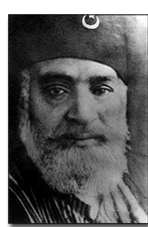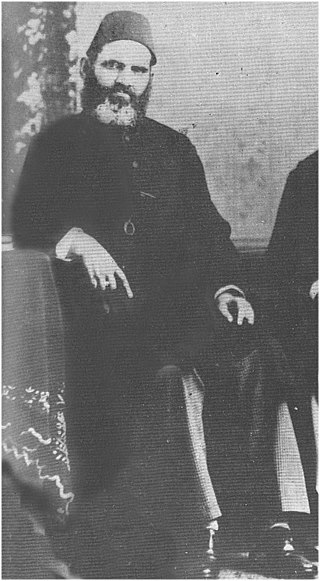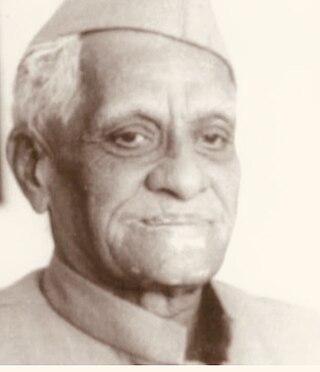
Aligarh is a city in the state of Uttar Pradesh in India. It is the administrative headquarters of Aligarh district, and lies 342 kilometres (213 mi) northwest of state capital Lucknow and approximately 130 kilometres (81 mi) southeast of the capital, New Delhi. The cities and districts which adjoin Aligarh are: Gautam Buddha Nagar, Bulandshahr, Sambhal, Badaun, Kasganj, Hathras, Etah and Mathura, as well as Palwal district of Haryana. As of 2011, Aligarh is the 53rd most populous city in India.

Shaukat Ali Khan was an Indian Muslim member of the Khilafat Movement. He was the elder brother of the renowned political leader Mohammad Ali Jouhar.

Muhammad Ali Jauhar Khan was an Indian Muslim freedom activist, one of the founders of All-India Muslim League, a pre-eminent member of Indian National Congress, journalist and a poet, a leading figure of the Khilafat Movement and one of the founders of Jamia Millia Islamia.

Mukhtar Ahmed Ansari was an Indian nationalist and political leader, and former president of the Indian National Congress and the Muslim League during the Indian Independence Movement. He was one of the founders of Jamia Millia Islamia University. He remained it's chancellor from 1928 to 1936.

Nawab Mohsin-ul-Mulk, Munir Nawaz Jang, also known as Syed Mir Mehdi Ali, was an Indian Muslim politician. He was a close friend of Syed Ahmed Khan, was involved in the Aligarh Movement and was one of the founders of the All India Muslim League in 1906.

Nawab Wiqar-ul-Mulk was a British Indian Muslim politician and one of the founders of All India Muslim League. He was also the maternal uncle of Sir Ziauddin Ahmed, a mathematician and proponent of the Aligarh Movement.

SirZiauddin Ahmad was an Indian mathematician, parliamentarian, logician, natural philosopher, politician, political theorist, educationist and a scholar. He was a member of the Aligarh Movement and was a professor, principal of MAO College, first pro vice-chancellor, vice chancellor and rector of Aligarh Muslim University, India.

Nawab Mir Akbar Ali Khan was governor of Uttar Pradesh in India from 1972 to 1974 and governor of Odisha from 25 October 1974 to 17 April 1976. He was a member of the Rajya Sabha for 18 years and he was deputy chairperson of the Rajya Sabha for 12 years. He was associated with Osmania University and was a member of the Senates of Aligarh Muslim University, Jamia Millia Islamia and Jawaharlal Nehru University. Later in 1957 he founded a Polytechnic in Hyderabad.

Al Jamiatul Ashrafia is a Sunni Madrasa in India. It is located in Mubarakpur in a Northern State of India, Uttar Pradesh.

Mohammad Habib (1895–1971) was an Indian historian, who worked at the Aligarh Muslim University. He was involved in the Indian Independence movement, and was an associate of both Gandhi and Jawaharlal Nehru.
Zuberi, also written as Zubairi, Zubairy, Zubayr, Zoberi, Zobairi, or Zbiri is a surname from Arabic, meaning a descendant of someone named Zubayr. It is particularly found among Muslims in India and Pakistan. Notable people with the surname include:

Khwaja Muhammad Yusuf was one of the top lawyers and landowners of Aligarh, a small but historically significant town in the ‘doab’ region of the state of Uttar Pradesh in northern India. He was among the first Indian Muslims to understand the nature and gravity of the issues posed by contemporary European colonialism. He was an Islamic liberal who believed that modern, Western-style education was essential for the survival of Indian Muslims in the contemporary world.
Akhtarul Wasey is an Indian scholar and academician, who serves as the president of Maulana Azad University, in Jodhpur, India. He formerly served as professor of Islamic Studies at Jamia Millia Islamia in New Delhi, where he remains professor emeritus in the Department of Islamic Studies.
Masud Husain Khan was an Indian linguist, the first Professor Emeritus in Social Sciences at Aligarh Muslim University and the fifth Vice-Chancellor of Jamia Millia Islamia, a Central University in New Delhi.
The Aligarh Movement was the push to establish a modern system of Western-style scientific education for the Muslim population of British India, during the later decades of the 19th century. The movement's name derives from the fact that its core and origins lay in the city of Aligarh in Central India and, in particular, with the foundation of the Muhammadan Anglo-Oriental College in 1875. The founder of the oriental college, and the other educational institutions that developed from it, was Sir Syed Ahmed Khan. He became the leading light of the wider Aligarh Movement.

Sarita Bhadauria is an Indian politician from Uttar Pradesh. She is also a member of 18th Legislative Assembly, Uttar Pradesh of India. She hails from the Etawah constituency in Uttar Pradesh which is considered to be the stronghold of Mulayam Singh Yadav and Akhilesh Yadav. She defeated the Samajwadi party's candidate by 17234 votes in the 2017 Assembly and by 4277 votes in 2022 Assembly elections.
Dr. Masood Ahmad is an Indian politician and a member of 1993 Legislative Assembly of Tanda, Uttar Pradesh of India. He represented the Tanda, Ambedkar Nagar constituency of Uttar Pradesh and was a state President of Rashtriya Lok Dal of Uttar Pradesh since August 2016 to March 2022. He was former Education Minister of Uttar Pradesh in 1993.

The history of Aligarh Muslim University begins with the Aligarh movement, which was a movement to establish a Western style of education for the Muslims of British India. The movement was pioneered by Sir Syed Ahmed Khan, who founded the Muhammadan Anglo Oriental College in Aligarh. Sir Syed retired at Aligarh, and undertook the charge of raising funds for the college, and supervising the construction of the campus.
Kamboh Nawabs of Meerut were an influential family based in Meerut during the Mughal and British colonial period.














